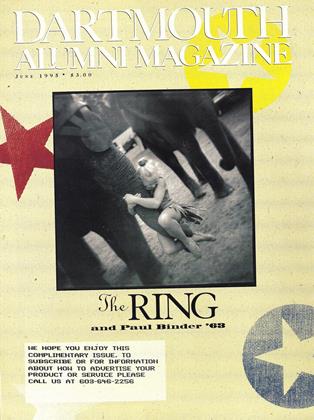Death, Survival, and Memory
June 1995 PROFESSORS SHALOM GOLDMAN AND ALAN TANSMAN, JOSEPH MEHLING '69Death, Survival, and Memory PROFESSORS SHALOM GOLDMAN AND ALAN TANSMAN, JOSEPH MEHLING '69 June 1995
Primo Levi, Survival inAuschwitz (Collier Books, 1993)—Calling his book, first published in 1958, an "interior liberation," Levi writes: "The need to tell our story to 'the rest', to make 'the rest' participate in it, had taken on for us, before our liberation and after, the character of an immediate and violent impulse, to the point of competing with our other elementary needs." Of all the class reading, this spoke loudest to our students.
David Roskies, Against the Apocalypse: Responses to Catastrophe in Modern Jewish Culture (Harvard University Press, 1984) A brilliantly argued book which challenges the view that the murder of the jews of Europe was an apocalyptic event without precedent or analogy.
Tom Segev,The Seventh Million: Israelis and the (Hill and Wang, 1993)—An incisive look at Israel's complicated ambivalence toward the "seventh million," concentration camp survivors who emigrated to Israel after the war.
Memories of the Camps (PBS Video)—Filmed by Alfred Hitchcock and other directors in 1945, this haunting documentary was suppressed as too graphic and vivid and stored in the vaults of the British Imperial War Museum for more than 40 years. It finally aired publicly on Frontline in 1989.
Richard H. Minear, editor and translator, Hiroshima: Three Witnesses. (Princeton University Press, 1990) Translations of the harrowing poetry andfiction of the three most famous "A-bomb writers," with introductions thatsituate them biographically, historically, and culturally.:
Masuji Ibuse, Black Rain, translated by John Bester (Kodansha International, 1969). The classic "A-bomb novel," Black Rani is based on diaries and interviews with survivors and focuses on the effects of radiation on one young woman as her family tries to arrange a marriage for her.
Takashi Nagai, The Bells of Nagasaki (Kodansha International, 1994)—A vivid account of the destruction of Nagasaki written from the perspective of a devoutly Christian Japanese doctor who lived through it.
Alan Tansman
Shalom Goldman
 View Full Issue
View Full Issue
More From This Issue
-
 Feature
FeaturePrince Chiming
June 1995 By Tyler Stableford '96 -
 Feature
FeatureAfter Eleven Commencing
June 1995 By Regina Barreca '79 -
 Cover Story
Cover StoryThe RING
June 1995 By Paul Binder '63 -
 Article
ArticleMemory and Catastrophe
June 1995 By Karen Endicott -
 Article
ArticleDr. Wheelock's Journal
June 1995 By "E. Wheelock" -
 Class Notes
Class Notes1982
June 1995 By George M. Thompson Jr.
JOSEPH MEHLING '69
-
 Feature
FeatureNotebook
Jan/Feb 2008 By JOSEPH MEHLING '69 -
 Photography
PhotographyBig Picture: Changing Lanes
Sept/Oct 2009 By Joseph Mehling '69 -
 Photography
PhotographyBig Picture: Art and Sciences
July/Aug 2010 By Joseph Mehling '69 -
 Photography
PhotographyBig Picture: Flag Football
Sept/Oct 2010 By Joseph Mehling '69 -
 Photography
PhotographyBig Picture: Disk Drive
May/June 2011 By Joseph Mehling '69 -
 Photography
PhotographyBig Picture: Book Nook
July/August 2011 By Joseph Mehling '69
Article
-
 Article
ArticleTHE MEL ADAMS CABIN IN THE LATE FALL
December 1922 -
 Article
ArticleFraternity Scholarship
AUGUST, 1927 -
 Article
ArticleGreen Derby Contests for 1939
April 1940 -
 Article
ArticleAlumni Award Goes to Charlie Zimmerman
December 1973 -
 Article
Article1974 Fund to Reach $3.75-Million Goal
July 1974 -
 Article
ArticleRequired Reading
SEPTEMBER 1996

